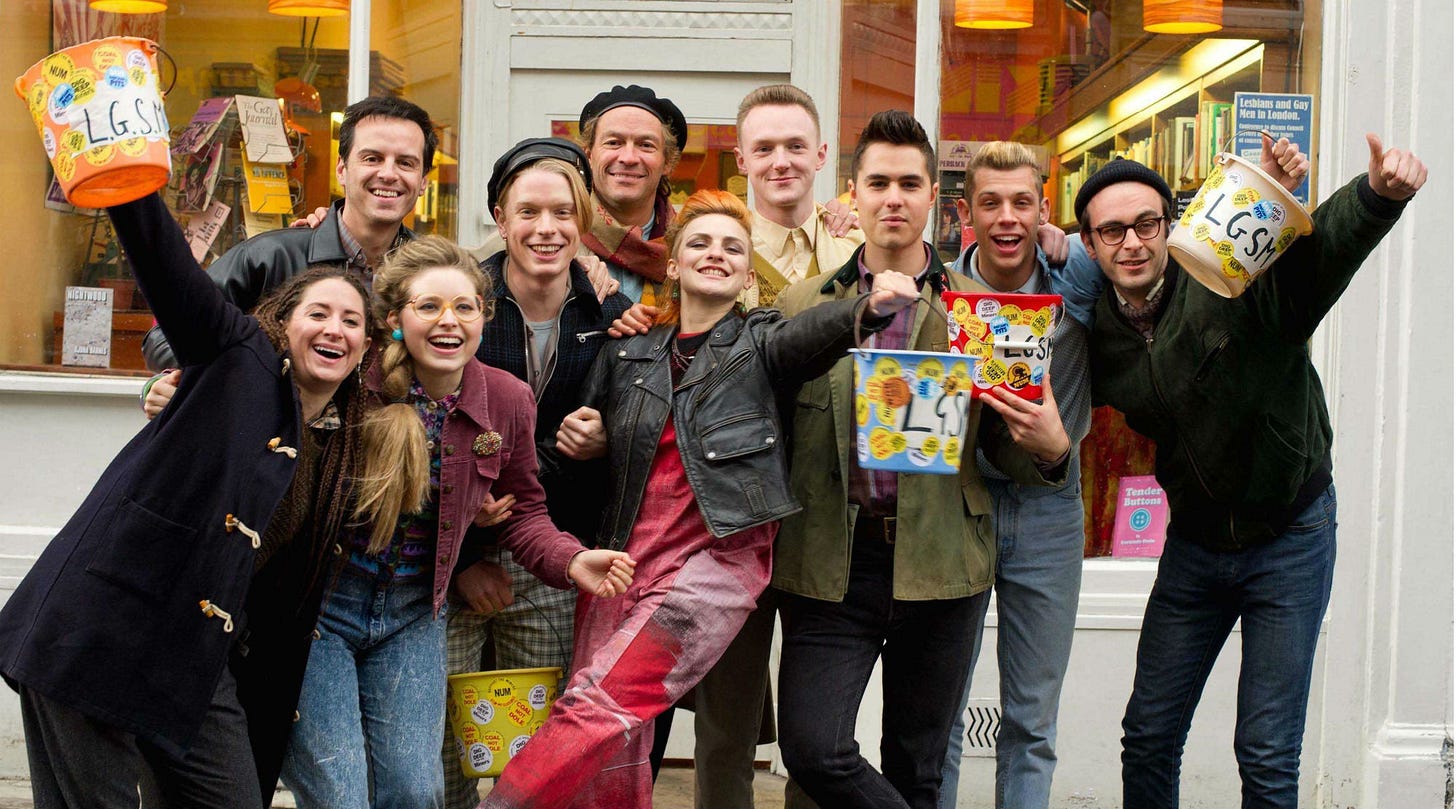Pride month is nearly over, and undoubtedly the highlight for me was my town's first ever pride, a joyous day which I spent in a hi-viz gently encouraging people to move their chairs into a more space-efficient configuration, like an extremely slow but satisfying game of Tetris.
The celebrations ended with a showing of the film-of-the-movement, 2014’s Pride, and a Q&A with Jonathan Blake, depicted in the film in his real-life role as a member of Lesbians and Gays Support the Miners (LGSM), a group who decided to reach across apparent divides in 1984 to support a Welsh mining community through the hardships of the miners strike, when the Thatcher government was essentially trying to starve them back to work. The story takes place against the background of the AIDS epidemic, and the dawning of gay liberation, but also the death and decay of an old way of Welsh life.
The tone of the film is warm, and one could be forgiven for feeling it is all a bit too easy for the characters to overcome their cultural differences and share commonality and, memorably, a night out in London’s gay scene. That’s where the Q&A with Jonathan was so fascinating- he pretty much (short of a few artistic flourishes) endorsed the narrative and thrust of Pride, and in fact even the little resistance to LGSM depicted in the village of Onllwyn was not obvious to the members at the time, though he later learned of its existence.
Made in 2014, the film emerged at the high-water mark of LGBT acceptance and rights- it is that which lend it the warmth in some ways- here are the fights we have won, here are the people who accepted us through solidarity and kindness. Of course, watching it in 2025 when trans rights, especially, are under threat in the UK, and Budapest Pride took place gloriously, but in defiance of a government ban, while Ballymena Pride was disrupted when someone released sewage onto the route- then it hits rather differently.
The Welsh miners aspects of the film also refract through the lens of events, subsequent both to the strike and the film. We know of course that the miners lost, that the pits closed, and really, given the impact of coal on the climate, we know that they needed to… just not like that. But I was also struck by the aspects of poverty depicted- in 2014, working people queuing for handouts of canned food was to an extent shocking- in any case, it is now a commonplace.
But this film is not a history lesson- not really. It is a beautiful character study, within this quite celebratory framework. There is not really a clear lead- George Mackay’s Joe is part of the focus, but so is Ben Schnetzer as the de facto leader of LGSM, Mark Ashton. But there are moments to shine for Paddy Considine as Dai, Jessica Gunning as future MP Sian James, and most notably for me, a small but heartbreaking role for Bill Nighy, who has a scene with Imelda Staunton while buttering bread which is just… amazing.
I’ve just dropped a lot of names- and yes, the cast is amazing- did I mention Andrew Scott is in this film in another small role with huge emotional valence. A few lines, a visit to his estranged mum… it is all done so minimally, but with such skill and confidence.
This is what Pride does- it is incredibly tightly written, sensitively directed and treats its characters as people, rather that vessels for plot or polemic. So it is a gay film that’s not really about sex, a political film that’s not really about politics.
Ultimately, and this is why I wanted to review it, the film is an ode to the power of solidarity. It’s not a piece of work laden with symbolism, but the image of hands held recurs, deliberately, across the running time. Reaching out to others, taking the risk of rejection, and receiving a clasped hand in return.
In 2014, it was a reminder. In 2025, after a decade of atomisation and division, it feels like a wake-up call. We have forgotten how to reach out to people who might not agree with everything we say and do, but with whom we have vital common cause. And that is why Pride demands to be watched and rewatched- under its cosy exterior, it has something vital to say, still.




